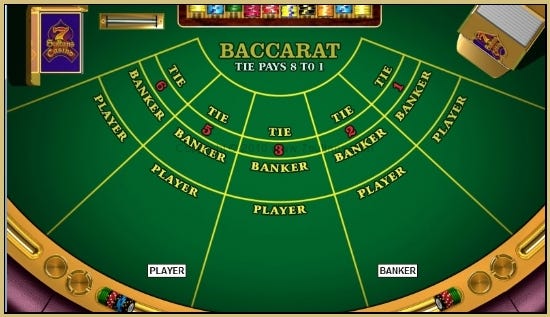Good enough for a tuxedo-clad James Bond and the slightly more dubious character of Lord Lucan, the historic card game of Baccarat has been entertaining game players for centuries.
Nearest to Nine Wins: Baccarat Guide

Nearest to Nine Wins: Baccarat Guide
Good enough for a tuxedo-clad James Bond and the slightly more dubious character of Lord Lucan, the historic card game of Baccarat has been entertaining game players for centuries.
Now a staple offering of real-world and online casinos all around the world, this simple yet sophisticated game continues to enthral. From the biggest online casino Ireland has to offer, to the bright lights of Las Vegas, this battle between player and dealer continues to intrigue those who keep up to date with the latest Casino News.
Whilst hugely popular, the game can appear complicated to the new player. As with most casino games, however, the rules of Baccarat are really far more straightforward than they may at first appear. Interested in following in the footsteps of 007 and co? Here’s all you need to know.
The Aim of The Game
Many casino games have a magic number. 21 represents the ultimate hand in Blackjack, whilst the dice game of Craps centres around the traditional lucky number of 7. In Baccarat it is the number 9 which represents the gambling Holy Grail.
Hands of cards are dealt to the player and the dealer. Whichever hand is closest to – but no higher than – the magic number 9 wins.
Card Values
In Baccarat the value of a card is determined by the number of pips it has. An Ace counts as 1, a Two counts as 2, and so on up to a nine. 10s and Face cards (J, Q, K) all count as zero.
If the total of a hand exceeds the number nine, the first digit of the number is dropped, with the second then being taken as the total for the hand, e.g. a 9 and a 6 would total 15, which would then drop the 1 to become a total of 5.
The Deal
At the start of a hand of Baccarat, two cards will be dealt to the Banker spot, and two to the Player spot. If the total of either of the hands is 8 or 9, this is known as a Natural win and no further cards are dealt. If both the player and dealer are dealt a Natural, the highest Natural wins.
In the absence of any Natural, play continues as follows. The Player’s hand will always be dealt with first according to the following rules.
- Total of 6 or 7 – The player receives no further cards.
- Total of 0,1,2,3,4 or 5 – The player is dealt a third and final card.
With the Player’s hand dealt with, the focus now switches to the Banker’s hand. Play again follows a set of predetermined rules which depend upon whether or not the player received a third card.
If the player did not receive a third card.
- Dealer total of 0,1,2,3,4 or 5 – Dealer Receives a third and final card.
- Dealer total of 6 or 7 – Dealer receives no more cards.
If the player received a third card, the Banker’s action depends upon the value of that card.
- If the value was a 2 or a 3 – The dealer receives a card if their hand totals 0,1,2,3 or 4.
- If the value was a 4 or a 5 – The dealer receives a card if their hand totals 0,1,2,3, 4 or 5.
- If the value was a 6 or a 7 – The dealer receives a card if their hand totals 0,1,2,3, 4,5 or 6.
- If the value was an 8 – The dealer receives a card if their hand totals 0,1 or 2.
- If the value was a 9, 10 or face card – Dealer receives a card if their hand totals 0,1,2 or 3.
With the above process having been completed, the final values of the Player’s and Banker’s hands are compared, and the result is declared; either a win for the Players Hand, a win for the Banker’s Hand, or a Tie.
Betting Options
Whilst the hands are called the “Players Hand” and “Bankers Hand”, these are no more than labels. Both are played by the ‘dealer’ with all players betting on both or either.
In Baccarat, betting involves placing wagers on one of three possible outcomes: the Player’s hand winning, the Banker’s hand winning, or a Tie. Here’s a breakdown of how betting works in Baccarat:
- Betting Options:
- Player: Bet that the Player’s hand will have a higher total.
- Banker: Bet that the Banker’s hand will have a higher total.
- Tie: Bet that both hands will have the same total.
- Placing Bets:
- Players place their bets before any cards are dealt.
- Bets can be placed on one, two, or all three outcomes.
- Card Dealing:
- Two cards are dealt to both the Player and the Banker.
- Sometimes, a third card is drawn for either hand based on specific rules.
- Winning Bets:
- Player Bet: Pays 1:1 if the Player’s hand wins.
- Banker Bet: Pays 1:1 if the Banker’s hand wins, but a 5% commission is usually deducted.
- Tie Bet: Pays 8:1 or 9:1 if both hands have the same total.
- House Edge:
- The house edge for the Player bet is around 1.24%.
- The house edge for the Banker bet is around 1.06%. The Banker’s hand has a slight statistical advantage due to the rules governing when a third card is drawn. The Banker has more information when making the decision to draw a third card. The Banker can react to the Player’s hand, which provides a tactical edge.
- The house edge for the Tie bet is much higher, typically around 14.36%.
What About Skill?
Players place their bets before any cards are dealt, which means there is no opportunity to influence the outcome based on the cards. The game follows a fixed set of rules for drawing cards, which eliminates any strategic decision-making during the play. Both the Player and Banker hands are dealt and drawn according to these predetermined rules, leaving no room for skillful play. Since the house edge is known and fixed, the only decision players make is where to place their bet (Player, Banker, or Tie). The outcome of each hand is purely determined by the luck of the draw, similar to other casino games like roulette or slots. The only “strategy” in Baccarat is to consistently bet on the Banker, due to its lower house edge, though this does not guarantee a win in the short term.
Rules in hand, all you need now is a martini “shaken not stirred”, and a little luck on your side, in order to one of the world’s most historic gambling games. To ‘try it out’ you can purchase an app at the Apple Store – or you can look up Baccarat on Youtube.








